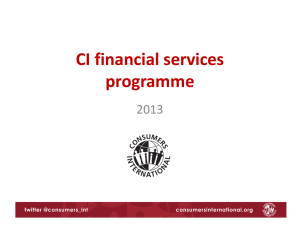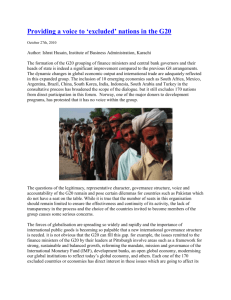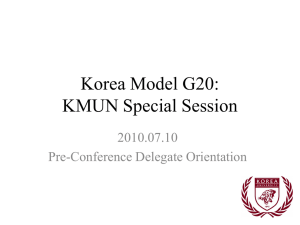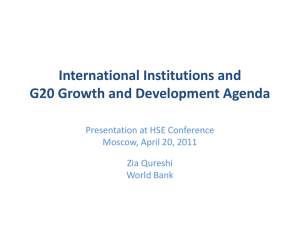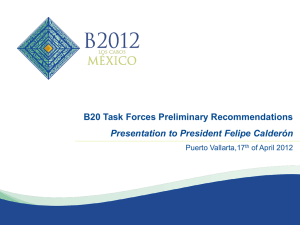Senior Economics Exploring G20 - Queensland Curriculum and
advertisement
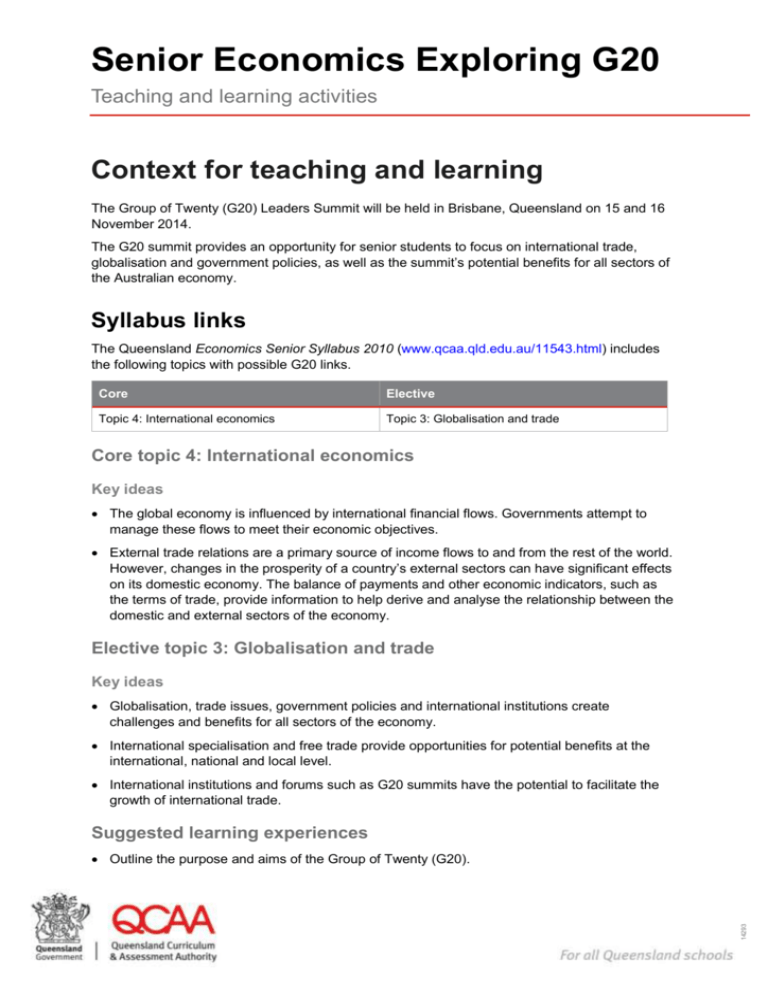
Senior Economics Exploring G20 Teaching and learning activities Context for teaching and learning The Group of Twenty (G20) Leaders Summit will be held in Brisbane, Queensland on 15 and 16 November 2014. The G20 summit provides an opportunity for senior students to focus on international trade, globalisation and government policies, as well as the summit’s potential benefits for all sectors of the Australian economy. Syllabus links The Queensland Economics Senior Syllabus 2010 (www.qcaa.qld.edu.au/11543.html) includes the following topics with possible G20 links. Core Elective Topic 4: International economics Topic 3: Globalisation and trade Core topic 4: International economics Key ideas The global economy is influenced by international financial flows. Governments attempt to manage these flows to meet their economic objectives. External trade relations are a primary source of income flows to and from the rest of the world. However, changes in the prosperity of a country’s external sectors can have significant effects on its domestic economy. The balance of payments and other economic indicators, such as the terms of trade, provide information to help derive and analyse the relationship between the domestic and external sectors of the economy. Elective topic 3: Globalisation and trade Key ideas Globalisation, trade issues, government policies and international institutions create challenges and benefits for all sectors of the economy. International specialisation and free trade provide opportunities for potential benefits at the international, national and local level. International institutions and forums such as G20 summits have the potential to facilitate the growth of international trade. Suggested learning experiences 14293 Outline the purpose and aims of the Group of Twenty (G20). Investigate the economic criteria established for G20 membership. Construct a table to identify: when and where each G20 Leaders Summit has been held the key economic issue/s focused on at each G20 summit. View the following videos featuring Griffith University G20 experts and explain from an economic perspective the potential benefits of the G20 Summit for Brisbane, Queensland, Australia as well as international trade: G20 Economics (Professor Fabrizio Carmignani) (www.qcaa.qld.edu.au/expert-videos.html) G20 Economics (Professor Tony Makin) (www.qcaa.qld.edu.au/expert-videos.html). Access the Economy information in the Interactive G20 map (Advanced) (http://g20.qcaa.qld.edu.au) and the Australian Government Department of Foreign Affairs and Trade (DFAT) (www.dfat.gov.au/trade/g20/index.html) websites. Define the following terms that may be used as economic performance indicators of G20 member nations: gross domestic product (GDP) GDP per capita real GDP current account balance inflation. Using the Interactive G20 map (http://g20.qcaa.qld.edu.au) and the Australian Government Department of Foreign Affairs and Trade (DFAT) website (www.dfat.gov.au/trade/g20/representation.html), take a virtual field trip of G20 member nations. When ‘visiting’ each member country, use the Economy information to appraise the chosen countries’ economic performance 2010–13. Select one G20 member country from Asia and Africa on the Interactive G20 map (Advanced) (http://g20.qcaa.qld.edu.au) and the DFAT website (www.dfat.gov.au/trade/g20/representation.html). Construct a graph/s to represent each country’s level of economic growth, employment and inflation from 2010–13. Analyse this data to comment on each government’s ability to achieve internal economic stability. Using the DFAT website (www.dfat.gov.au), find the factsheet information on Australia’s merchandise trade (value of exports to and imports from) with G20 member countries in 2012–13. Use this to rank Australia’s top five G20 trading partners. Examine data and information on Australia’s trade and investment relationship with G20 in 2012–13. Explain its significance to the Australian economy. The European Union is a G20 member and an example of economic integration. Explain the difference/s between economic integration and an organisation focused on economic cooperation. Refer to information on the 2014 G20 Leaders Summit for 2014 and its objectives: Explain how G20 decision makers can encourage a more efficient allocation of resources. Analyse the potential economic benefits of the G20 summit for non-member nations. Draw conclusions on how and why G20 members may be able to influence global economic growth and development. Senior Economics Exploring G20 Teaching and learning activities Queensland Curriculum & Assessment Authority July 2014 Page 2 of 4 From an economic perspective, assess the possible benefits for the Queensland household and government sectors due to Queensland’s 2014 G20 summit host-state role. Investigate the potential trade and investment opportunities provided for the business sector within the Queensland economy. Present your ideas to a Better Business for Queensland forum held in conjunction with the G20 summit. Refer to Ricardo’s theory of international trade. Outline how Ricardo’s theory may be used to influence decision makers at a G20 summit. Also explain the range of factors that contribute to economic decision making being a complex process at the international level. Assessment opportunities Supervised written assessment designed to assess Dimension 1: Knowledge and understanding, Dimension 2: Investigation and Dimension 3: Synthesis and evaluation from Section 2 of the Economics Senior Syllabus 2010 (www.qcaa.qld.edu.au/11543.html). An extended response providing an opportunity for students to write in response to stimulus materials. For Year 11, the response would be 400–600 words and for Year 12, 600–800 words as required by the conditions outlined in Section 5 of the syllabus. The task, for example, may focus on analysing data and information from a variety of G20-related source materials and drawing conclusions on the G20 summit’s benefits for Brisbane, Queensland, Australia as well as international trade. Research assessment designed to assess each of the dimensions from Section 2 of the Economics Senior Syllabus (www.qcaa.qld.edu.au/11543.html). An opportunity for students to demonstrate the research process on a G20-related task and for the outcomes of that research to be presented in a written, spoken or multimodal response. The syllabus conditions (outlined in Section 5) for each type of response include: Written — for Year 11 this would be 800–1000 words; for Year 12, 1000–1500 words Spoken — for Year 11 this would 3–4 minutes spoken; for Year 12, 4–5 minutes Multimodal — for Year 11 this would be 3–5 minutes; for Year 12, 5–7 minutes. The task, for example, may focus on investigating how G20 decision makers can encourage a more efficient allocation of resources and drawing conclusions on the extent to which the G20 has the potential to influence global economic growth and development. Resources Below is a list of resources to support the Exploring G20 teaching and learning activities. G20 website (www.g20.org) Information about the G20, its members, priorities, past summits, event schedule as well as the Queensland 20 (Q20) and the benefits it presents Queensland’s business, community and government sectors from Australia’s presidency in 2014. Department of Prime Minister and Cabinet’s G20 website (www.dpmc.gov.au/g20/index.cfm) The Department of Prime Minister and Cabinet’s website focuses on Australia’s 2014 G20 presidency. DFAT’s G20 website (www.dfat.gov.au/trade/g20/index.html) The Department of Foreign Affairs and Trade’s (DFAT) website outlines the G20 as a forum Senior Economics Exploring G20 Teaching and learning activities Queensland Curriculum & Assessment Authority July 2014 Page 3 of 4 for international cooperation, its role within the global economy, and Australia’s participation in and contribution to the G20. It has an interactive world map with links to factsheets on the recent economic performance of, and Australia’s trade and investment relationship with, each G20 member country. G20 Economics (Professor Fabrizio Carmignani) video (www.qcaa.qld.edu.au/expertvideos.html) A short video of G20 expert Professor Fabrizio Carmignani explaining the international economic issues that contributed to the G20’s establishment and success, and the potential economic benefits of the 2014 G20 Summit in Brisbane, Queensland. G20 Economics (Professor Tony Makin) video (www.qcaa.qld.edu.au/expert-videos.html) A short video of G20 expert Professor Tony Makin discussing the G20’s role within the global economy and the potential economic benefits of the 2014 G20 summit being held in Brisbane, Queensland. Tony Abbott uses address to World Economic Forum in Davos to promote virtues of free trade (www.abc.net.au/news/2014-01-23/abbott-vows-to-promote-free-trade-as-g20chair/5216230) This article by the Australian Broadcasting Corporation (ABC) outlines Prime Minister Tony Abbott’s call for free trade and increased global growth ahead of the 2014 G20 summit. G20 looking to increase GDP by 2 percent (www.businessreviewaustralia.com/money_matters/g20-looking-to-increase-gdp-by-2-percent) This article reports Australian Treasurer Joe Hockey’s comments that the G20 plans to increase GDP. Cairns to host G20 finance ministers (www.abc.net.au/news/2012-08-05/g20-financeministers-to-head-to-cairns/4178000) This article explains that the G20 summit will have an economic impact across Queensland. Trade and Investment Queensland’s G20 website (http://export.qld.gov.au/g20) The Trade and Investment Queensland website outlines how it will help Queensland maximise G20 trade and investment opportunities. Brisbane hotels booked in advance for world leaders attending the G20 summit (www.news.com.au/national/brisbane-hotels-booked-in-advance-for-world-leaders-attendingthe-g20-summit/story-fncynjr2-1226731838996) This article outlines some of the potential economic benefits for Brisbane as the 2014 G20 host city. Griffith and the G20 (www.griffith.edu.au/events/g20-summit/activities) South-East Queensland-based Griffith University outlines its program of activities to complement the 2014 G20. More information For more information, please visit the QCAA website at www.qcaa.qld.edu.au. Senior Economics Exploring G20 Teaching and learning activities Queensland Curriculum & Assessment Authority July 2014 Page 4 of 4

